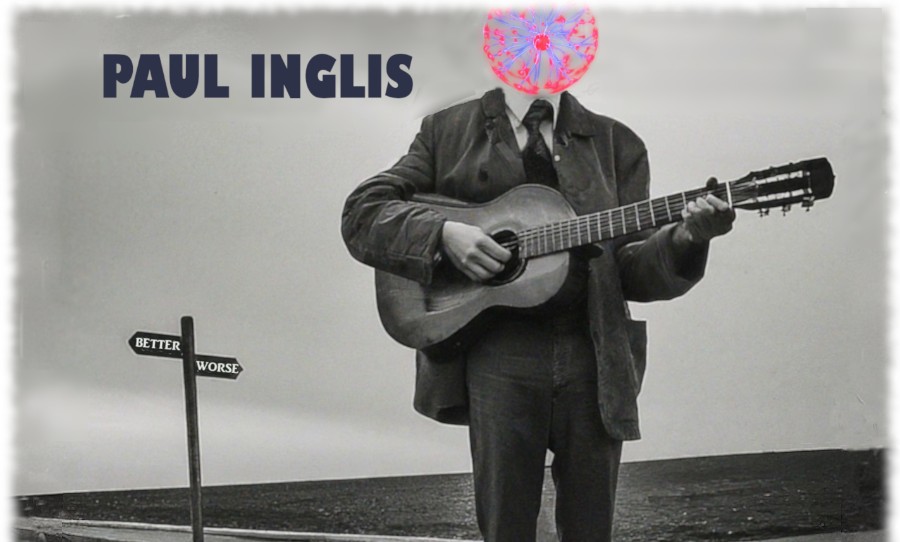“I see the album as an evolution of what I’ve been doing,” Paul Inglis tells us of his latest LP ‘Off The Charts’.
Paul Inglis took us on a journey with ‘Off The Charts’, a sprawling album that traced the Newcastle musician from glam-rock to acoustic balladry and invited listeners into vivid lyrical worlds.
While the 11-track project only arrived this month, Inglis is already at work on it’s follow-up, promising yet more soft-rock odysseys for us to pour over.

Below, we caught up with Inglis for a deep-dive into ‘Off The Charts’, his knack for storytelling and his plans for the future. Scroll down for our full chat with Paul Inglis, and listen to his latest album below.
HAPPY: What are you up to today?
INGLIS: It’s Friday. I jotted down a few lines for a future song about an hour ago.
HAPPY: What is the music scene like in your neck of the woods?
INGLIS: There’s a number of venues here in Newcastle and the usual mix of covers/tribute bands plus some originals. There’s a few aspiring singer-songwriters too, you’ll always see them at open-mic nights.
HAPPY: You have said that artists like David Bowie and Joni Mitchell are inspirations. What is it about each of these artists that inspires you?
INGLIS: Bowie had an absolute fearlessness that is particularly inspiring. He was never afraid to get into unfamiliar musical territory. I don’t know if I can really live up to that, but it reminds me that anything is possible when it comes to songwriting.
Joni Mitchell had an ethereal quality in both her voice and melodies. She was also a very keen observer; her lyrics are stellar, some of the best in the business.
I’m definitely attracted to good lyricists, but a beautiful melody and interesting harmony can only help to increase the effectiveness of a song. Bowie wrote rather odd disjointed lyrics at times, on purpose, but he also had a strong sense of melody.
I also particularly like artists who are unique, so that’s part of their appeal to me.
HAPPY: We absolutely loved ‘Off The Charts’! Given that it’s your sixth album, did you feel the need to evolve your sound, or were you happy just refining what you know?
INGLIS: Thank you! I see the album as an evolution of what I’ve been doing. It’s definitely related to my earlier work. However, I don’t consciously refer back to my earlier work.
I’m not trying to recycle old ideas. It’s conceivable that at some point I will head off in a totally different direction, but I can’t imagine what that will be.

HAPPY: There’s a timelessness to that album, but it also feels forward-looking. How do you go about striking that balance when you write music?
INGLIS: I try to keep the music grounded in traditional songwriting techniques, but I’m not trying to imitate any particular period of music in the past.
I want everything to be fresh and new as well as connected to what came before. It’s not an easy balance to strike, and I suppose one way I deal with it is to try to keep the chord sequences as novel as possible without being confusing.
HAPPY: Many of the songs double as stories. How do you go about conceiving the characters and narratives for these songs?
INGLIS: The more I write, the more I find to write about, if that makes sense.
I can hear the potential for songs in almost anything: a scene from a movie, an overheard conversation, the sudden recollection of a person or event from a decade or two ago, a detail from a news story.
I jot all these things down looking for a pattern to emerge. If the narrative already exists because the song is based on a true story, like “Tell ‘Em He Died Game”, then I look for a way into the narrative that isn’t so obvious.
For that song I noticed that Lowry wasn’t married, but I assumed that a dangerous bushranger would have a certain kind of appeal, like a rock star, so I gave him an imaginary girlfriend and told the story from her point of view.
It’s really all about making it relatable but not too obvious. Songs are a bit like jigsaw puzzles. Some of them are easier to solve than others. Sometimes the pattern is obvious immediately, other times it takes days, weeks, months or longer.
HAPPY: Can you elaborate a little on the story behind ‘Soul of a Poet’?
INGLIS: The initial lines are about an exchange between Dylan Moran and me when I was sitting front row centre at one of his shows last year. That’s the danger of sitting in the front row at a show.
He caught sight of me and said something like “Look at this fellow, he looks so relaxed!” and then later on in the set when he was trying to provoke some commentary from me he said “Come on, I know you can do it! You’ve got the soul of a poet!”
It was said in jest, but was probably more true than he intended. The second verse refers to David Bowie, who I did meet once.
He didn’t make any particular profound pronouncements about my soul, so it was one of those very memorable moments even though it occurred quite by chance. It was remarkable that I met him that way, the odds against it were enormous.
The chorus becomes very melancholy. When you’re young the world is a strange noisy confusing place, then when you get older you think you’ve got it all worked out but then something happens to undermine that, so you’re back to square one.
But eventually a lot of people reach a point where they think they’ve got it all worked out, they end up with a particular set worldview, which is quite dangerous. That’s why you’ve got people following terrible leaders.
I’ve never thought I had it all worked out, and that’s part of the melancholy. Occasionally it’s interrupted by serendipitous occurrences, which add a bit of wonder. So yes, that’s what the title is referring to – not losing that sense of childlike wonder.
HAPPY: What made you veer into glam-rock territory on ‘Glam the Glam’?
INGLIS: I have a little “glam-rock” following among certain of my fans, so I usually like to throw a little morsel their way every album. It’s fun, because it reminds me that I don’t need to be too serious about everything. One day I might do a glam EP.
HAPPY: Anything else exciting on the horizon that you can tease for us?
INGLIS: I’m working on songs for the next album already. I do have a particular idea I came up with from a conversation with another songwriter that relates to an aspect of Australian history that is not very well known.
As he was telling the rather shocking story, it occurred to me that it might make for an interesting song, if not a whole album. We’ll have to see what we come up with.
I’m also deep into working on a novel that I hope people will find interesting. It’s a thriller but I think it’s quite different from almost anything out there.
HAPPY: What makes you happy?
INGLIS: Not looking for happiness, just finding it. Trying to make happiness will tend to make a person unhappy. Friends, family, a beautiful voice, a finely honed melody, the love of a good woman.



